7 Ayurvedic Remedies for Hair Loss & Re-Growth In 2025 | Natural Solutions
Introduction: Understanding the Root Cause of Hair Loss
- The issue of hair loss is no longer exclusive to aging.
- Young adults and even teenagers have become increasingly concerned about it in recent years.
- Ayurvedic Remedies for Hair Loss Although it’s typical to lose 50 to 100 hairs a day, severe hair loss, bald spots that are noticeable, and receding or thinning hairlines are frequently concerning indicators of a more serious problem.
- Understanding the underlying reasons of hair loss is more important than just treating its symptoms if you want to manage it successfully.
- Experts, trichologists, and practitioners of Ayurveda all concur that hair loss is rarely a singular issue. Deeper abnormalities in the body, scalp, or lifestyle are frequently the cause.
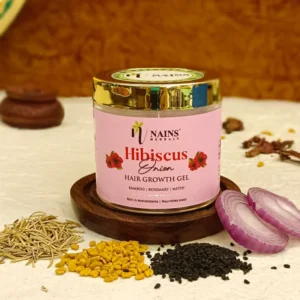
- Common Causes of Hair Loss:
- Nutritional Deficiencies: Inadequate intake of vital nutrients such as protein, zinc, iron, vitamin D, and biotin can damage hair roots and inhibit the growth of new hair.
- Hormonal Imbalances: The natural cycle of hair development is frequently disturbed by conditions such as thyroid diseases, PCOS (Polycystic Ovary Syndrome), menopause, or androgenic alopecia (pattern baldness).
- Stress & Anxiety: Telogen effluvium, or abrupt hair loss, can result from emotional stress, trauma, or even long-term mental exhaustion that forces hair follicles into a resting phase.
- Genetics: Your risk of developing hair loss is greatly increased if you have a family history of androgenetic alopecia, early balding, or hair thinning.
- Bad Conditions of the Scalp: Psoriasis, seborrheic dermatitis, dandruff, and fungal infections all produce an unhealthy environment on the scalp that inhibits hair growth.
- Chemical Exposure and Heat Styling: Hair shafts and follicles are weakened by frequent use of harsh shampoos, hair dyes, straighteners, curling irons, and excessive blow-drying.
- Bad Lifestyle Decisions: Insufficient sleep, irregular eating patterns, dehydration, smoking, and alcohol use all have a detrimental effect on the general health of hair.
Why Ayurveda is Effective for Hair Problems
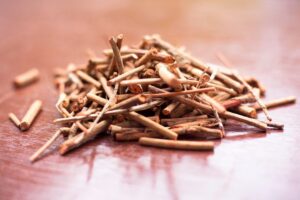
- Ayurveda, an age-old Indian medical system that has been practiced for more than 5,000 years, provides a natural and comprehensive method of hair treatment. In contrast to contemporary therapies that frequently use chemical-based products or offer short-term fixes, Ayurveda focuses on identifying the underlying causes of hair issues as well as each person’s particular body constitution.
- Root Cause Treatment Over Symptom Suppression: While contemporary hair care solutions may provide instant volume or shine, they do not deal with the fundamental problem. According to Ayurveda, hair loss is a sign of internal imbalances that are frequently caused by stress, digestive problems, or dosha (Vata, Pitta, or Kapha) imbalances. Hair health naturally improves when these abnormalities are corrected.
- Maintaining Hair Health by Harmonizing the Doshas:
In the philosophy of Ayurveda: Inflammation, early greying, hair thinning, and irritation of the scalp are caused by excess Pitta. Dryness, brittle hair, frizz, and split ends are all signs of an imbalanced Vata. Oiliness, dandruff, clogged follicles, and hair loss are all symptoms of elevated Kapha. Herbs, dietary habits, and Ayurvedic treatments are intended to help reestablish this equilibrium while nourishing the scalp and hair roots. - Use of Time-Tested Natural Herbs: Bhringraj, Amla, Brahmi, Fenugreek, and Neem are among the potent herbs used in Ayurveda that are well-known for their nourishing, anti-inflammatory, and hair-rejuvenating qualities. These herbs strengthen hair follicles, increase blood flow to the scalp, and support healthy, side-effect-free natural hair growth.
- Stress on Diet and Lifestyle: Diet and lifestyle have a direct impact on hair health. For long-lasting effects, Ayurveda suggests a nutrient-rich diet, mindful eating, adequate hydration, and stress-relieving exercises like yoga and meditation.
- Holistic, Long-Term Benefits: Ayurvedic procedures guarantee a slow, safe, and sustainable increase in hair thickness, quality, and growth, in contrast to chemical treatments that could produce short-term hair improvement but long-term harm.
- Supported by Modern Research & Traditional Wisdom: Although Ayurveda has its roots in tradition, a number of contemporary scientific studies have confirmed the anti-hair fall and hair-strengthening qualities of herbs like Brahmi, Amla, and Bhringraj, enhancing its legitimacy as a natural remedy for hair issues.
1. Bhringraj – The King of Herbs for Hair
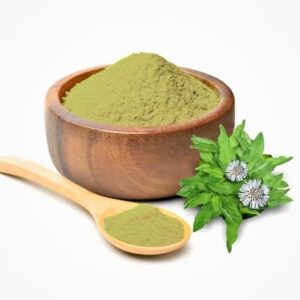
- In Ayurveda, Bhringraj, scientifically known as Eclipta Alba, is highly esteemed and is referred to as the King of Herbs for Hair.
- Ayurvedic Remedies for Hair Loss Traditional Indian medicine has long praised Bhringraj for its remarkable capacity to revitalize hair, encourage hair growth, and treat a variety of scalp-related conditions.
- Its ability to nourish hair is also supported by recent studies, making it a dependable, all-natural remedy for people who are dealing with hair loss, early graying, or low-quality hair.
- Benefits of Bhringraj for Hair Health:
- Stimulates Hair Growth:
- Bhringraj is rich in essential nutrients, minerals, and vitamins that stimulate blood circulation to the scalp.
- This increased blood flow ensures that hair follicles receive the nourishment they need to grow healthy, thick strands of hair.
- Strengthens Hair Roots:
- Regular use of Bhringraj strengthens the hair from its roots, reducing breakage, split ends, and overall hair fall.
- It enhances the hair shaft’s structure, making it more resilient to external damage.
- Combats Dandruff and Scalp Irritation:
- Bhringraj possesses powerful anti-inflammatory and antimicrobial properties. It soothes an irritated scalp, controls dandruff, and helps in treating minor infections that may block hair growth.
- Prevents Premature Greying:
- According to Ayurveda, Bhringraj pacifies aggravated Pitta dosha, which is often responsible for premature greying of hair.
- Consistent application of Bhringraj oil can help maintain the natural pigment of the hair for longer.
- Improves Hair Texture and Shine:
- Bhringraj not only promotes hair growth but also enhances the overall quality of hair.
- With regular use, hair becomes smoother, shinier, and more manageable.
- Reduces Stress, Indirectly Controlling Hair Fall:
- Bhringraj is known for its calming effects.
- When massaged into the scalp, it helps relieve tension, reduces stress, and promotes better sleep—factors that indirectly reduce stress-induced hair fall.
How to Use Bhringraj Oil or Powder:
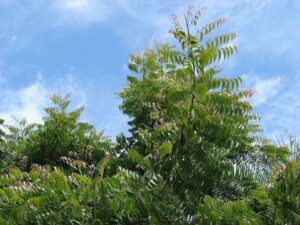
- Abhyanga, or Bhringraj Oil Massage:
The most popular and successful technique is to massage Bhringraj oil over the scalp. Actions to take: The Bhringraj oil should be slightly warmed. Using your fingertips, apply the oil straight to the scalp after parting your hair. For eight to ten minutes, gently massage in circular patterns to increase blood circulation. For optimal effects, leave it on for at least one to two hours or overnight. Use a gentle, herbal shampoo to wash. For noticeable improvements in hair texture and growth, apply two to three times each week. - Powdered Bhringraj Hair Mask:
Bhringraj powder can be applied as a hair mask if you’d rather have a deep conditioning treatment. Components: Two tablespoons of powdered Bhringraj Two teaspoons of yogurt (for sustenance) One tablespoon of optional coconut oil Actions to take: Make a smooth paste by combining all the ingredients. Apply uniformly along the hair strands and on the scalp. Let it sit for thirty to forty minutes. Use a gentle shampoo and lukewarm water to rinse well. Benefits: This mask strengthens hair, lessens dryness, and increases shine in addition to nourishing the scalp. - Carrier Oils and Bhringraj:
To increase the advantages of Bhringraj oil, you can also mix it with other nutritious oils like castor, coconut, or almond oil. Expert Tip: Always use organic Bhringraj powder or pure, cold-pressed Bhringraj oil from a reliable supplier for best results. Since Ayurvedic hair care relies heavily on consistency, use these treatments on a regular basis for at least two to three months to see noticeable results.
2. Amla – The Natural Vitamin C Boost
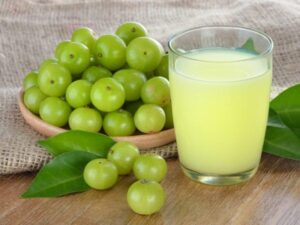
- One of the most potent superfoods in Ayurveda, amla, commonly called the Indian Gooseberry (Emblica officinalis), is particularly beneficial for hair health.
- Amla has long been used to strengthen the scalp, nourish the hair, and encourage thick, glossy hair because of its powerful antioxidant qualities and remarkably high vitamin C concentration.
- Amla is categorized in Ayurveda as a Rasayana, a revitalizing herb that slows down premature aging, including graying of the hair, and increases overall vitality in addition to hair quality.
- How Amla Strengthens Hair Follicles:
- Rich Source of Natural Vitamin C: Amla contains nearly 20 times more Vitamin C than an orange. Vitamin C is a powerful antioxidant that helps in collagen production, which is essential for strengthening hair follicles and supporting healthy hair growth.
- Boosts Scalp Circulation: The phytonutrients and minerals present in Amla improve blood circulation to the scalp, ensuring that hair follicles receive ample oxygen and nutrients required for robust growth.
- Reduces Hair Fall: By nourishing the hair roots and strengthening hair shafts, Amla effectively reduces hair fall. It also minimizes hair breakage and split ends, making hair appear fuller and healthier.
- Delays Premature Greying: Premature greying is frequently caused by an excess of Pitta dosha in the body. Amla’s cooling and Pitta-balancing qualities help keep the hair’s natural pigment intact, preventing greying and maintaining its young hue.
- Cleanses and Conditions the Scalp: Amla functions as a natural scalp cleanser. It creates the perfect environment for hair growth by removing dandruff, extra oil, and contaminants that clog hair follicles.
- Strengthens Hair from Root to Tip: Consistent application of Amla prevents hair thinning, increases hair elasticity, and encourages thicker, glossier hair. Those with weak, brittle, or chemically treated hair will particularly benefit from it.
DIY Amla Hair Pack for Nourishment:

- There are several ways to use amla: fresh, powdered, or as oil. Using a nourishing hair pack is one of the best methods to take advantage of its advantages.
- Ingredients:
- 2 teaspoons of powdered amla (or, if available, fresh amla pulp)
- 2 tablespoons yogurt (rich in protein and moisture)
- One tablespoon of olive or coconut oil (optional for extra nutrition)
- A little amount of lemon juice (optional for controlling dandruff)
- Steps:
- In a bowl, combine the yoghurt and Amla powder to make a smooth paste.
- Add lemon juice for additional scalp washing and coconut oil for additional conditioning.
- Apply the mixture evenly on your scalp and along the hair strands after parting your hair.
- To improve absorption, gently massage the scalp for a few minutes.
- Give the pack a half-hour to an hour.
- Use a gentle, herbal shampoo and lukewarm water to rinse well.
3. Neem – The Scalp Cleanser
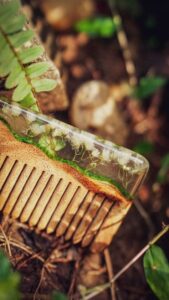
- Ayurvedic and traditional medicine place a high value on neem (Azadirachta indica), often known as the “Village Pharmacy” in India, because of its potent antibacterial, antifungal, and anti-inflammatory qualities.
- Neem has been valued for generations as a natural remedy for a number of skin and scalp issues, such as hair loss, dandruff, and infections.
- The basis for strong, thick, and nourished hair in terms of hair care is a clean and healthy scalp.
- With its purifying and detoxifying properties, neem is the best natural way to cleanse the scalp and create an atmosphere that is conducive to hair follicle growth.
- Neem’s Role in Reducing Dandruff and Itchiness
- Strong Antifungal Action: The invasion of the fungus Malassezia on the scalp is frequently the cause of dandruff. Natural antifungal chemicals found in neem effectively fight fungal infections, which lessens dandruff and stops it from coming back.
- Reduces Itchy and Irritated Scalp: Dryness, dandruff, or underlying scalp diseases are major causes of itchy scalps. Neem’s cooling and anti-inflammatory qualities provide instant relief from inflammation, redness, and itching.
- Clears the Follicles and Purifies the Scalp: Neem is a mild yet effective cleaner. It gets rid of dandruff flakes, dead skin cells, excess oil, and accumulated filth that clog hair follicles and prevent hair from growing.
- Prevents Infections and Scalp Acne: Neem’s antibacterial qualities are quite helpful for people who have boils, mild infections, or acne on their scalp. Frequent use keeps the scalp healthy by preventing bacteria accumulation.
- Rebalances Excess Oil (Kapha Imbalance): According to Ayurveda, an inflamed Kapha dosha is frequently associated with excessive oiliness. Neem is perfect for persons with oily scalps who are prone to dandruff since it helps balance the production of oil on the scalp.
How to Prepare Neem Hair Rinse:
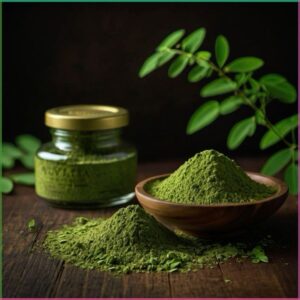
- A Neem hair rinse is an easy, effective, and chemical-free way to maintain scalp hygiene and prevent dandruff-related hair problems.
- Ingredients:
- 10-15 fresh Neem leaves (or 2 tablespoons dried Neem leaves)
- 2 cups water
- Few drops of lemon juice (optional, for added dandruff control)
- Steps:
- Boil the Neem leaves in 2 cups of water for 10-15 minutes.
- Allow the mixture to cool down completely.
- Strain the liquid and discard the leaves.
- Add a few drops of lemon juice if desired.
- After shampooing your hair, pour the Neem rinse slowly over your scalp and hair.
- Gently massage for a minute or two and leave it on for 5 minutes.
- Rinse with plain water or leave it as a leave-in scalp treatment (recommended for mild dandruff).
4. Brahmi – For Thick and Strong Hair
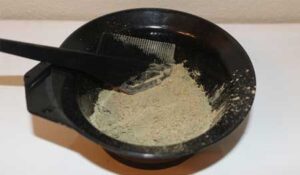
- Because of its significant advantages for mental and hair health, Brahmi (Bacopa monnieri), sometimes referred to as the “Herb of Grace,” is highly valued in Ayurveda.
- Brahmi has long been used as a stress reliever and memory enhancer, but it is also praised for its capacity to support thick, healthy hair, strengthen hair roots, and nourish the scalp.
- According to Ayurvedic philosophy, mental exhaustion and stress are the hidden causes of hair loss and poor hair quality.
- Brahmi treats these problems in a comprehensive way by reviving the hair and soothing the mind.
- Brahmi’s Benefits for Hair Growth:
- Strengthens Hair Roots: Brahmi prevents thinning and lessens hair loss by strengthening hair follicles from the roots and providing deep nourishment to the scalp. It revitalises the scalp, guaranteeing robust and resilient hair growth.
- Encourages Denser Hair development: By igniting latent hair follicles, regular application of Brahmi oil or powder encourages denser hair development. It improves the hair’s overall texture and volume.
- Lessens Split Ends and Hair Breakage: Brahmi works as a natural conditioner for damaged and dry hair. Longer, healthier hair strands result from its ability to seal in moisture, reduce breakage, and avoid split ends.
- Cools the Scalp and Reduces Pitta Imbalance: According to Ayurveda, an excessive Pitta dosha frequently causes irritation of the scalp, premature greying, and hair loss. Because of its inherent cooling qualities, brahmi helps calm Pitta and promotes a healthy scalp environment for hair growth.
- Combats Scalp Irritation and Dandruff: Brahmi contains bioactive substances with antimicrobial and anti-inflammatory qualities that help reduce dandruff, dryness, and itching of the scalp, promoting a healthier scalp.
- Stress Reduction for Hair Health: Prolonged stress can cause hair loss by interfering with the cycle of hair growth. Brahmi is well-known for its relaxing and adaptogenic qualities, which lower anxiety, improve sleep quality, and subtly encourage the growth of good hair.
Brahmi Oil Massage for Stress Relief and Hair Fall Control:
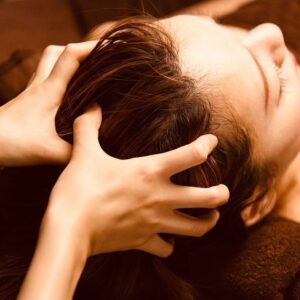
- A nourishing Brahmi oil massage is one of the best ways to use Brahmi for hair care because it not only strengthens hair but also reduces stress.
- Ingredients:
- 2–3 tablespoons of Brahmi oil (which can be purchased unadulterated or mixed with coconut or sesame oil).
- A few teaspoons of essential oil of lavender or rosemary (optional for extra relaxation)
- Steps:
- To improve absorption, reheat the Brahmi oil a little.
- Using your fingertips, liberally apply the oil to your scalp after parting your hair.
- For eight to ten minutes, gently massage in circular patterns to promote blood flow and soothe the scalp.
- To nourish the hair strands, keep running the oil along them.
- For at least two hours, or better yet, overnight, leave the oil on.
- Use a gentle, herbal shampoo to rinse.
- Frequency: Two to three times a week, a Brahmi oil massage promotes deep relaxation, strengthens hair, and lessens hair loss- all of which are critical for healthy hair and general wellbeing.
- Expert Advice: Mix Brahmi oil with other Ayurvedic oils, such as Bhringraj or Amla oil, for best effects. To further improve hair health from the inside out, you can also drink Brahmi tea or supplements under the supervision of an Ayurvedic practitioner.
5. Fenugreek (Methi) Seeds – The Protein Powerhouse
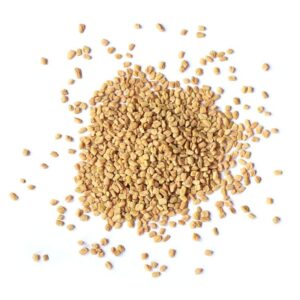
- Methi, another name for fenugreek seeds, is a common ingredient in Indian cooking, but its uses are not limited to that. Because of its high protein content, vital nutrients, and capacity to prevent hair loss and thinning, fenugreek is considered a powerful hair care component in Ayurveda.
- Fenugreek seeds, sometimes referred to as a Protein Powerhouse, are a great source of protein, iron, lecithin, vitamins, and minerals that are essential for strong, healthy hair. For people who have weak, thin, and lifeless hair, these little golden seeds can be a game-changer.
- How Fenugreek Seeds Prevent Hair Thinning:
- Rich in Nicotinic Acid and Protein: The building block of hair is protein. Nicotinic acid and vital proteins included in fenugreek seeds fortify the hair shaft, stop breaking, and lessen hair thinning.
- Stimulates Hair Follicles: By improving blood flow to the scalp, fenugreek stimulates dormant hair follicles and promotes the growth of new hair. Over time, regular use might lead to fuller, denser hair.
- Treats Scalp Irritation and Dandruff:
- Dandruff, dryness, and itching are all conditions that, if ignored, can lead to hair thinning. Fenugreek’s anti-fungal and anti-inflammatory qualities help address these issues.
- Prevents Hair Breakage and Fall: Soaked fenugreek seeds’ mucilage works as a natural conditioner to increase hair elasticity and reduce breakage, which is a leading factor in hair thinning.
- Adds Volume and Shine: Regular use of fenugreek treatments enhances the texture of hair generally, giving the appearance of thicker, glossier, and fuller hair.
- Maintains Scalp pH and Oil Production: Fenugreek aids in preserving the pH balance and controlling oil production of the scalp, both of which are critical for maintaining scalp health and avoiding clogged follicles that impede hair development.
Simple Fenugreek Hair Mask Recipel:
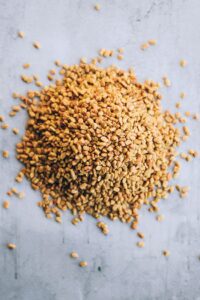
- A simple yet incredibly powerful at-home treatment for preventing hair loss, encouraging thickness, and nourishing the scalp is a fenugreek hair mask.
- Ingredients:
- two to three tablespoons of methi (fenugreek) seeds
- Soaking water
- One spoonful of yoghurt (optional; adds moisture and protein)
- One tablespoon of olive or coconut oil, if desired, for conditioning
- Procedure:
- Soak the fenugreek seeds in water for at least eight hours, or overnight.
- The soaked seeds should be ground into a thick, smooth paste in the morning.
- For extra nutrition, mix the paste with yoghurt and coconut oil.
- On your scalp and along the hair strands, liberally apply the paste.
- Let it sit for thirty to forty minutes.
- Use a gentle, herbal shampoo and lukewarm water to rinse well.
6. Aloe Vera – The Soothing Moisturizer
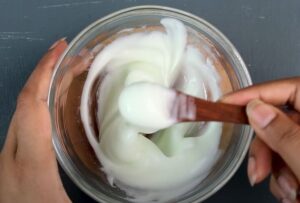
- Known as the “Plant of Immortality,” aloe vera is a wonderful herb that is well-known for its remarkable calming, moisturising, and healing qualities.
- Aloe Vera (Ghritkumari) is prized in Ayurveda for its skincare properties as well as its capacity to promote natural hair growth, lessen hair loss, and enhance scalp health.
- Extracted from the plant’s fleshy leaves, aloe vera’s gel-like substance is packed with vitamins, minerals, enzymes, and amino acids that are essential for feeding hair follicles, soothing irritated scalps, and creating the perfect environment for healthy hair growth.
- Aloe Vera’s Role in Hair Fall Control and Regrowth:
- Deeply Moisturises the Scalp: Aloe Vera moisturises the hair and scalp by acting as a natural conditioner. It is especially helpful for people with dry, flaky scalps, which frequently cause hair loss and low-quality hair.
- Diminishes Scalp Inflammation: One of the unspoken reasons for hair loss is inflammation. Anti-inflammatory enzymes and polysaccharides found in aloe vera help to relieve irritation, lessen redness, and soothe an irritated scalp—all of which improve the environment for hair follicles.
- Clears Blockage in Hair Follicles: Oil accumulation, dead skin cells, or dandruff can clog hair follicles, limiting the creation of new hair. The mild cleansing properties of aloe vera aid in unclogging clogged pores and encourage the development of new hair.
- Prevents Breakage and Strengthens Hair:
- Aloe Vera, which is high in vitamins A, C, E, and B12, strengthens hair strands, increasing their flexibility and reducing breakage and split ends—two main reasons of hair thinning.
- Regulates Scalp pH: Unbalanced scalp pH can lead to oiliness, dandruff, and hair loss. Aloe Vera promotes the best possible scalp health and hair growth by assisting in the restoration of the scalp’s natural pH balance.
- Promotes Hair development: Over time, fresh hair development is stimulated by the proteolytic enzymes found in aloe vera, which heal damaged skin cells on the scalp and activate dormant hair follicles.
How to Apply Aloe Vera Gel for Best Results:
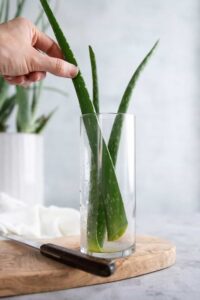
- To optimise its hair advantages, aloe vera can be used either pure or in combination with other natural components.
- How to Apply Pure Aloe Vera Gel:
- Fresh gel can be extracted from an aloe vera leaf. Because it can irritate the skin, make sure the yellow latex portion is removed.
- Using your fingertips, apply the transparent gel immediately to the scalp. For five to seven minutes, give yourself a light massage to increase blood flow.
- For more thorough feeding, leave it on for at least half an hour or overnight. Use a gentle shampoo and lukewarm water to rinse.
- Frequency: two to three times per week for noticeable hair health improvements.
- Hair Mask with Aloe Vera and Coconut Oil
Aloe Vera’s moisturising and hair-strengthening properties are enhanced when combined with coconut oil. Components:- Three tablespoons of newly made aloe vera gel Two teaspoons of coconut oil Actions to take:
- Blend the coconut oil and aloe vera gel until a smooth consistency is achieved. Distribute evenly across the hair strands and scalp. For one to two hours, leave it on.
- Use a gentle shampoo to give it a thorough wash.
- Fenugreek & Aloe Vera Anti-Hair Fall Mask
Fenugreek and aloe vera together provide potent benefits for people who are suffering from severe hair loss. Components:- Two tablespoons of gel for aloe vera Two tablespoons of powdered fenugreek Actions to take: Create a paste by combining the components.
- Apply to the hair and scalp, paying particular attention to the roots. Let it sit for thirty to forty minutes. Use water and a gentle shampoo to rinse.
7. Ashwagandha – Stress Management for Hair Health
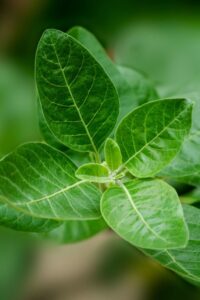
- Ashwagandha (Withania somnifera), often referred to as the King of Adaptogenic Herbs, is a cornerstone of Ayurvedic medicine known for its ability to combat stress, promote vitality, and restore internal balance.
- While Ashwagandha is primarily celebrated for boosting energy levels and immunity, its role in promoting hair health is often overlooked yet profoundly impactful.
- In Ayurveda, chronic stress (Sadhaka Pitta imbalance) and elevated cortisol levels are considered major triggers for hair fall, premature greying, and hair thinning.
- Ashwagandha, with its adaptogenic and rejuvenating properties, helps reduce stress levels and addresses hair loss from the inside out.
- The Connection Between Stress and Hair Loss:
- Stress and hair loss are directly related, according to numerous research. High amounts of stress interfere with the hair growth cycle’s normal operation, frequently forcing hair follicles into the telogen (resting) phase too soon and resulting in excessive shedding, a condition called medically as Telogen Effluvium.
- The Impact of Stress on Hair Health:
- Hormonal Imbalance: Stress causes cortisol levels to rise, which throws off hormone balance, weakening hair roots and influencing hair growth cycles.
- Poor Blood Circulation: Stress can narrow blood vessels, which lowers the amount of nutrients and oxygen that reach hair follicles. This results in slower regeneration and hair loss.
- Nutritional Deficiencies:
- Stress can cause the body to lose vital vitamins and minerals, such iron, zinc, and B vitamins, that are necessary for healthy hair.
- Exacerbation of Scalp Conditions:
- Stress frequently exacerbates psoriasis, dandruff, and scalp acne, which in turn indirectly causes hair loss.
How Ashwagandha Helps Combat Stress-Induced Hair Loss:
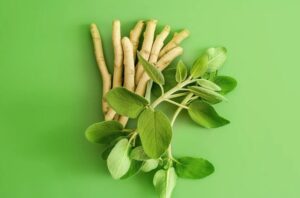
- Lowers Cortisol Levels: Ashwagandha has been shown in studies to reduce cortisol levels, which are the body’s main stress hormone. Reduced cortisol helps restore hormonal balance, creating favorable conditions for hair regrowth.
- Enhances Sleep Quality: Stress-related sleep deprivation can dramatically hasten hair loss. Ashwagandha encourages sound sleep, which benefits general health, including the vitality of hair.
- Strengthens Hair Follicles: Ashwagandha strengthens hair roots and encourages healthy hair development by enhancing blood circulation and nutrition delivery to the scalp.
- Strengthens Scalp Immunity: Ashwagandha strengthens immunity and lowers inflammation, avoiding infections or ailments that could impede hair growth.
- Postpones Premature Greying: One known cause of premature greying is ongoing stress. The antioxidant qualities of ashwagandha aid in preventing damage to the cells that produce hair colour.
- How to Consume Ashwagandha for Hair Benefits:
- When taken internally as part of your regular wellness regimen, ashwagandha works best. Here are several sensible and secure strategies to incorporate it:
- A traditional Ayurvedic tonic made with ashwagandha powder and warm milk Ingredients:
- One teaspoon of powdered ashwagandha One cup of warm milk, either plant-based or cow’s milk An optional sprinkle of turmeric for extra antioxidant support To taste, add jaggery or honey.
- Actions to take:
- Add the powdered ashwagandha to the heated milk. If desired, add honey and turmeric. Take this tonic right before bed to help you sleep better and feel less stressed.
- Tablets and Capsules of Ashwagandha
Standardised ashwagandha supplements come in tablet or pill form for convenience.- The dosage 300–600 mg per day is the usual amount, however for a customised dosage, always speak with an Ayurvedic practitioner or healthcare professional.
FAQS
1.How long does it take to see results with Ayurvedic remedies for hair fall?
Ayurvedic hair care is a natural, gradual process. Most people notice visible improvement in hair texture, reduced hair fall, and enhanced thickness within 8-12 weeks of consistent use. However, results may vary based on individual health, severity of the problem, and lifestyle habits.
2. Can I use multiple Ayurvedic remedies together for hair regrowth?
Yes, you can combine remedies like Bhringraj oil, Amla packs, and Aloe Vera treatments. In fact, using a combination of internal (diet, herbs) and external (oils, masks) approaches often delivers better results. Just avoid overloading your scalp with too many treatments at once; space them out during the week.
3.Are Ayurvedic remedies effective for all hair types?
Absolutely. Ayurveda works on the principle of balancing your body’s doshas (Vata, Pitta, Kapha), not on hair type alone. Whether you have dry, oily, curly, or straight hair, these remedies are safe and effective when tailored to your needs.
4.Is it safe to apply Ayurvedic oils like Bhringraj or Brahmi daily?
While Ayurvedic oils are natural, daily oiling may not suit everyone, especially those with oily scalps. For most people, 2-3 times a week of oil massage is sufficient. Over-oiling can clog pores, so always observe how your scalp responds.
5. Can stress really cause hair fall, and how does Ashwagandha help?
Yes, stress is a significant contributor to hair fall as it disrupts hormones and hair growth cycles. Ashwagandha is an Ayurvedic adaptogen that reduces cortisol (stress hormone) levels, promotes relaxation, and indirectly supports healthy hair growth.
6. Are there any side effects of using Ayurvedic hair care remedies?
Generally, Ayurvedic remedies are gentle and safe. However, always do a patch test, especially with herbs like Neem or Amla, to rule out allergic reactions. If you’re pregnant, nursing, or on medication, consult a doctor before taking internal Ayurvedic herbs.
7. Can I use Ayurvedic remedies along with chemical treatments like hair color or keratin?
Yes, but with caution. Ayurvedic remedies can soothe and nourish chemically treated hair, but it’s best to avoid applying herbs like Amla or Neem immediately after chemical treatments. Give your hair at least 7-10 days to recover before using Ayurvedic remedies.
8. Is diet really important for hair regrowth?
Absolutely. Hair health starts from within. A diet lacking in essential nutrients like protein, iron, Vitamin C, and healthy fats can trigger hair loss. Ayurveda emphasizes a balanced, nourishing diet as a foundation for healthy, strong hair.
9. How often should I wash my hair while following these remedies?
Washing 2-3 times a week with a mild, herbal shampoo is ideal. Over-washing strips natural oils and weakens hair, while under-washing may lead to scalp buildup. Adjust frequency based on your hair type and climate.
10. Can men also benefit from these Ayurvedic hair loss remedies?
Yes! These remedies are equally effective for men. Ayurvedic solutions like Bhringraj oil, Fenugreek masks, and stress-reducing herbs like Ashwagandha are beneficial for men experiencing hair thinning, bald patches, or hair fall.
